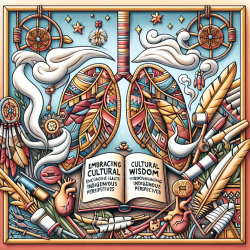The integration of Indigenous worldviews into public health research is not just beneficial; it is essential for creating effective and culturally relevant policies. The research article "Breathing clean air is S?’áh Naagháí Bik'eh Hózhóó (SNBH): a culturally centred approach to understanding commercial smoke-free policy among the Diné (Navajo People)" provides valuable insights into how Indigenous perspectives can enhance our understanding of smoke-free policies.
The Diné Worldview and SNBH Paradigm
The Diné paradigm of S?’áh Naagháí Bik'eh Hózhóó (SNBH) is a belief system that guides harmonious living. It emphasizes balance across four areas: thought, body, emotions, and home. This holistic approach ensures that the wellness of the whole person is considered, encompassing body, mind, spirit, and environment.
Applying SNBH to smoke-free policy enhances our understanding of Navajo principles for well-being. By juxtaposing this analysis with conventional qualitative methods, researchers can illuminate and interpret Diné perspectives on the health and economic impact of commercial secondhand smoke.
Key Findings from the Research
- Cultural Teachings: Traditional family teachings within the Diné culture reinforce healthy behaviors and discourage smoking. These teachings emphasize mutual respect and living in harmony.
- Economic Impact: Participants were generally unaware of the specific economic implications of smoke-free policies on Navajo Nation. There is a need for data that illustrates tobacco-related healthcare costs.
- Health Effects: The detrimental health effects of secondhand smoke resonated with participants. However, many expressed a desire for statistics specific to Navajo Nation.
- Cultural Balance: The SNBH framework helps identify sources of imbalance and promotes solutions that restore harmony.
Implications for Practitioners
For practitioners looking to improve their skills and understanding, this research highlights the importance of integrating Indigenous perspectives into public health strategies. Here are some steps you can take:
- Engage with Indigenous Communities: Build relationships with Indigenous communities to understand their unique cultural perspectives and incorporate these insights into your practice.
- Promote Cultural Teachings: Encourage the use of traditional teachings as protective factors against smoking and other harmful behaviors.
- Advocate for Data Collection: Support efforts to collect data specific to Indigenous communities to better understand the impact of public health policies.
- Pursue Further Research: Consider conducting or supporting research that uses Indigenous paradigms to explore health issues within these communities.
The integration of Indigenous worldviews into public health research not only enriches our understanding but also ensures that policies are culturally relevant and effective. By embracing these perspectives, practitioners can contribute to healthier communities and more equitable health outcomes.
To read the original research paper, please follow this link: Breathing clean air is S?’áh Naagháí Bik'eh Hózhóó (SNBH): a culturally centred approach to understanding commercial smoke-free policy among the Diné (Navajo People).










